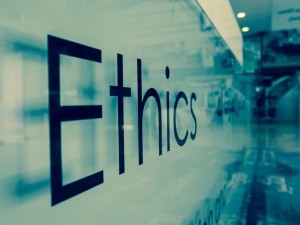Is it time to update journalism ethics for the 21st century?
 The field of journalism is changing rapidly as technology advances, audience habits change, the marketplace evolves and the news cycle hits warp speed. Some argue that journalism ethics need to change as well.
The field of journalism is changing rapidly as technology advances, audience habits change, the marketplace evolves and the news cycle hits warp speed. Some argue that journalism ethics need to change as well.
The list of ethical challenges facing journalism today is a long one. How can we get at the truth when flooded by unverified information? How do we maintain integrity as new business models and partnerships become necessary for survival? How should journalists behave on social media platforms?
onMedia put a few questions on changing journalism ethics to Steve Buttry, an American journalist, editor and educator who writes and speaks frequently on the topic.
Should ethical standards in journalism evolve along with changes in the profession or are they immutable?
Some values are certainly immutable, but ethical standards are more specific than the underlying values. And even values change over time. For instance, objectivity didn’t start as an important value of journalism, but was an economic response to serving news organizations of varying political views in a time when having a viewpoint was regarded as important. So the notion that all of our values are timeless is exaggerated anyway.
Take the general underlying value that journalists should attribute our sources of information. Perhaps that is immutable. But the specific standards of how we apply the value need to be updated to respond to such matters as technology (the ability to link to our sources of information) and practice (excessive use of unnamed sources and weak explanations of why reporters grant confidentiality to sources).
What is driving this need for change?
Technology certainly is driving some of the change. In addition to the linking issue I’ve cited, public discussions on social media have presented ethical issues we need to address. The government’s ability to snoop has created ethical issues relating to unnamed sources and our ability to keep promises of confidentiality. The news cycle raises new issues relating to our long-held principles of fairness: Allegation and response often come in separate updates of a running story, for instance. The marketplace also presents new twists to old issues: The value of independence is a long-held value in journalism ethics, and new developments such as native advertising present new situations in which to apply that value.
We also can update our standards as people develop better practices independently of technology. A checklist is not a technological development, but it is the best system ever developed to prevent errors, so effective that it is required for such high-pressure professionals as surgeons and pilots. Well, when Craig Silverman [of the corrections blog Regret the Error] started advocating accuracy checklists for journalists, that wasn’t a technological development or a marketplace change. It was just a smart journalist calling us to raise our standards in a way we hadn’t thought of before. But he’s right, and we should require and teach the consistent use of checklists.
Can you give an example of how ethics should evolve in the context of technological developments?
Linking is a perfect example. Attribution has never been a value that journalists practiced consistently. Some attributed vaguely, especially if the competition had beaten them, either attributing to “media reports” or using passive voice, such as “was reported.” So the very fact that we can link now presents ethical choices and debates: Should we require linking in ethics codes or just encourage it in practice? My view is that ethical codes should say that journalists should link to their digital sources. I was pleased to see the New York Times address this, even if they did it as a matter of style, rather than ethics. And you should embed actual original materials (tweets, videos, documents) when possible, rather than merely quoting from them.
While you can’t link to your unnamed sources, technology presents important issues there, too. Ethics codes say we should keep promises of confidentiality, but that’s a technology issue today, too. If you grant confidentiality to a source, how do you protect that? Using encryption software, “burner” cellphones and other technology measures?
Are considerations like objectivity and fairness now considered outdated?
 The journalist who is practicing objectivity still exercises opinions several times on every story. You decide that this story is more worthy of your time. Then you decide on the sources you will interview for the story. Then you decide which facts you gather belong in the story and which won’t make the story. And which fact(s) will lead the story, and which words you use to tell the story. We think of ourselves as being objective throughout the process, and we call these “news judgments,” rather than opinions.
The journalist who is practicing objectivity still exercises opinions several times on every story. You decide that this story is more worthy of your time. Then you decide on the sources you will interview for the story. Then you decide which facts you gather belong in the story and which won’t make the story. And which fact(s) will lead the story, and which words you use to tell the story. We think of ourselves as being objective throughout the process, and we call these “news judgments,” rather than opinions.
Fairness has its flaws, too, because we started equating fairness with balance, which sometimes abdicated our obligation to seek the truth and report it. Instead of actually reporting the truth, we balanced conflicting statements in the name of fairness, sometimes publishing statements we knew were lies and failing to debunk them sufficiently or at all.
I don’t dismiss the value of neutrality (which I prefer to “objectivity,” because we aren’t objects; we’re people). And I do think we should be fair. But I think some of our practices in the name of these old values need re-examination, and I’m pleased that we are discussing these values and how to apply them.
What has the rise of social media had on thinking about journalistic ethics?
Let’s take two examples of ways that social media has presented ethical challenges: Verification of facts and expression of personal opinions.
Verifying information we heard from the community has always been an important challenge for journalists. You get an anonymous tip over the phone or you get a tip from a trusted source and you don’t publish it right away; you get to work trying to learn whether it’s true. Social media is another important source of tips for journalists. But the tips are right out there in public (as many rumors we chase have always been), and they have this retweet button that lets us add our credibility to the tips and rumors. So we need to learn how to join the social media conversation and still apply our standards of verification and accuracy.
Opinions have never been inherently bad journalism. As I noted, journalism was largely opinionated before the ethic of objectivity developed. And even in the era of objectivity, we had editorial writers, cartoonists and columnists who were still expected to express their opinions. And, of course, in our newsrooms and in bars and private conversations, even the so-called objective journalists were pretty free with their personal opinions, even about matters they covered. Sometimes journalists got in trouble for expressing these opinions, but usually the conversations were private, among colleagues, family and friends, so no one got in trouble. Social media feel like a similar conversation, but the setting is more public.
I don’t think news organizations are in agreement in how to address these social media issues, but I think we’re having some good conversations about the issues, and providing better guidance than we were a few years ago.
How do you ensure good journalism ethics are actually followed by journalists? Publish a code?
I think ethics codes are helpful, but good conversations about journalism are more helpful and more important. I have been involved in six notable efforts to improve ethical guidance for journalists. I think they show the variety of both the issues we face and the guidance we need.
Two were efforts to provide overall codes for journalists to follow, the Society of Professional Journalists Code of Ethics and Poynter’s Guiding Principles for the Journalist. I think both updates were helpful, but neither went as far as I would have liked (both, for instance, failed to address linking). The Radio Television Digital News Association also is working to update its ethics code.
Three other efforts took narrow slices of journalism ethics, rather than trying to update a whole code, and provided detailed advice in that particular area:
- Rules of the Road by J-Lab, examining ethics of hyperlocal news.
- Telling the Truth and Nothing But, a joint effort by several journalism organizations addressing plagiarism and fabrication.
- The Verification Handbook, produced by the European Journalism Centre.
In addition the Online News Association is working on a project to produce building blocks for news organizations to produce their own ethics codes, reflecting their values and standards. We expect that project to be finished later this spring.
In general, how do you feel that the profession is doing these days when it comes to ethics?
I’m pleased that we have such a robust discussion of ethics in journalism, and I think the conversation will result in more ethical journalism. We have honest disagreements about some topics, and I don’t think that means the people who disagree with me are unethical. While I am pleased with this attention to ethics, the frequency with which we see shameful practices such as plagiarism and fabrication is discouraging. I was discouraged that [CNN host and Washington Post columnist] Fareed Zakaria’s employers were not more responsive to the thorough documentation of his extensive plagiarism.
All in all, I’d say journalists care a lot about ethics and generally make good ethical decisions. But I’d still like us to do better.
Steve Buttry has more than 40 years’ experience in the news business. He has been a reporter, editor and educator. He was formerly the Digital Transformation Editor for Digital First Media and today is the a visiting scholar at the Manship School of Mass Communication at Louisiana State University. He blogs extensively on the media at The Buttry Diary. You can find him on Twitter at @stevebuttry.
Photo credits: flickr/Dan Mason CC:BY-NC-SA; Steve Buttry; flickr/Toban B. CC:BY-NC)
Interview by Kyle James, post edited by Kate Hairsine
Related onMedia Posts
‘The values of traditional journalism still matter’
Bloodshed in the news – dealing with graphic images
Digital photo editing and the ethical line between aesthetics and truth?




